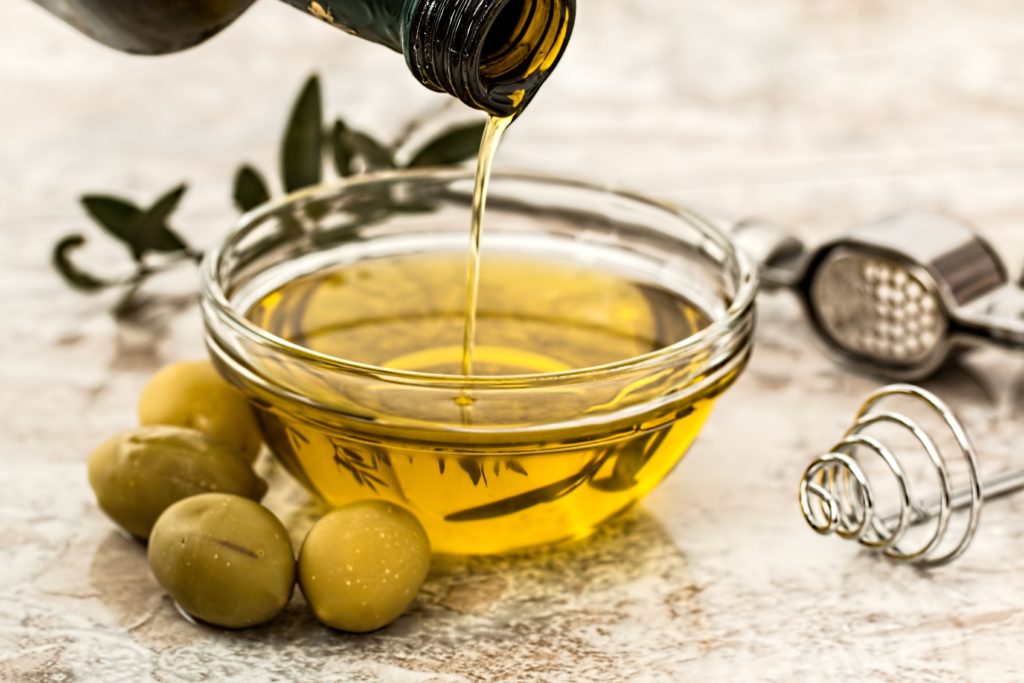The variety of cooking oils on the market to saute, sizzle and bake with is really quite extensive. We are here to help you understand what each oil is made up of, what type of cooking each oil is best used for, PLUS the calorie breakdown of each (which might just surprise you).

Extra Virgin Olive Oil or Olive Oil?
Extra Virgin Olive Oil (EVOO) is at the top of our recommendation list when it comes to the type of oil that provides the most health benefits with the added bonus of a delicious taste to go with it. EVOO is one of the best ways you can boost your healthy monounsaturated fats. Make it a base for salad dressings, use it as your oil to cook meat, roast veggies, saute stir-fries and to add to sauces. It truly is one of the most versatile, and most nutritious. You can find out more about the different type of healthy fats right here!
Olive oil is still one of the healthiest oils on the market, however, EVOO provides a far less processed version, being an unrefined oil. It is an oil that is created naturally, not extracted using chemicals or heat. This helps in allowing the oil to retain the benefits from its natural antioxidants, anti-inflammatory properties and vitamins that help in boosting things like your immunity and mental health too.
Both EVOO and Olive Oil are resistant to higher heat levels whilst cooking, making it harder for the oil to be broken down. Instead, they end up being absorbed by the cooked food, also helping the cooked food to retain some nutrients that are usually lost through cooking. EVOO and Olive Oil are best-used for low to medium heat cooking.
Coconut Oil
Coconut oil for a while was dubbed a ‘super food’ in the health food world. However, generally, many health professionals don’t agree with this claim due to its high levels of saturated fat, which can negatively impact cholesterol levels. It is an oil that is recommended to be enjoyed in moderation, with little to no research actually backing up the fact that coconut is really a ‘superfood’.
Due to its high saturated fat content, coconut oil is great for a higher smoke point cook, plus it also has a longer shelf life. It is often used best in baking, low-heat roasting, and greasing due to at room temperature, it being a solid oil. For dairy-free recipes, it is especially popular as an alternative to butter.
Avocado Oil
Avocado oil is definitely one of the lesser-known oils on the market. It is best for very high-temperature cooking as it has one of the highest smoking points. This makes it ideal for fish, eggs, or chicken, stir-frying or sauteing. On top of this, due to its delicious creamy avocado flavour, it is a great addition when whipping together homemade salad dressings. It has one of the highest monounsaturated fat contents of all cooking oils and is a wonderful source of vitamin E.
Similar to extra virgin olive oil, avocado oil is unrefined, providing much healthier natural benefits. However, it is often found at a higher price point than other oils, making it less popular and widely used in households for day-to-day cooking.
Sesame Oil
Sesame oil is most commonly and best used when cooking beautiful, fragrant Asian dishes, typically when using a wok. A little goes a long way with this oil both in its flavour and consistency, so be careful not to overdo it! It contains a stunning scent due to its sweet, nutty flavour perfect for your next stir fry or curry.
Sesame oil is high in a number of antioxidants, plus in certain Asian culture, such as Taiwan, it has been used for centuries as an anti-inflammatory property such as on cuts, scrapes, toothaches or joint pain. On top of this, it is an oil that is lower in its cholesterol levels, unlike some others.
Vegetable (Canola/Sunflower) Oil
Vegetable oils are any oil that is derived from a plant-based source, with canola and sunflower oils being some of the most popular and well-known. Vegetable oils are most commonly used for deep frying due to their high smoke point, low price point and lack of flavour. When it comes to your local fish and chips shop, you can almost guarentee this is the oil that is being used.
Vegetable oils are not one of the most nutritional oils, aside from containing vitamins E and K. It isn’t an oil that should be completely ignored, but you will find most nutritionists will point you in the direction of olive oil for more nutritious health benefits.
What are the calories for each? (1 tbsp)
Extra Virgin Olive Oil: 120 cal (save calories by using an EVOO spray)
Olive Oil: 133 cal
Coconut Oil: 117 cal
Sesame Oil: 124 cal
Avocado Oil: 123 cal
Vegetable Oil: 121 cal
As you can see above, the calorie differences between each of the cooking oil we looked into aren’t particularly varied. Instead, it is the quality of the ingredients that should be the priority when choosing an oil to use on a regular basis. Some are definitely better than others for certain meals, depending on the smoke point and flavour. For example, coconut oil is great for baking and sesame oil is great for Asian meals.
For plenty more awesome tips and tricks, hundreds of recipes, meal plans and constant support and motivation to help you along your health and weight loss journey, join the SuperSquad today. Click here to learn more, and take advantage of one of our best offers ever!
Our biggest goal here at SuperFastDiet is to spread the word on how to best find both physical and mental health and wellbeing in a simple and effective way through our three pillars, SuperFood, SuperFast and SuperLife. Could you do us a huge favour and share the blog above with 3 people you think might benefit! It really would mean so much. Thank you!


